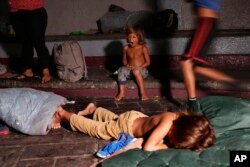Mexican immigration authorities have cleared a park of camping Central American migrants and another makeshift encampment of Haitians and African migrants outside an immigration detention center near the Guatemala border.
It appeared Wednesday that most of the migrants had been transported to a fairgrounds on the outskirts of Tapachula that were already being used to house other migrants.
With the dual actions, authorities seemed to be trying to get a handle on a situation that was growing unsustainable. It was the second time they had transferred migrants camped outside the detention center to the fairgrounds. Newly arriving migrants had camped there again since the last time in late April.
About 100 migrants were pushed out of the Tapachula park around midnight Tuesday. Families grabbed bedding and guided sleepy children away, not knowing where they were going.
Meanwhile, about 1,000 migrants were moved from outside the detention center where they had camped for weeks awaiting word on requests for asylum or permits that would allow them to continue north.
Witnesses said both moves were carried out without violence. In the case of the larger group outside the detention center, the migrants moved voluntarily.
Buses in the night
Carlos Alcantara, who sells fruit outside the detention center, said several buses pulled up late Tuesday night. Officials spoke with the migrants, the majority of whom then boarded the buses.
“They told them they wanted to move them for hygiene reasons,” he said.
Emaly Elisiane, a Haitian woman traveling with seven relatives, said officials told the migrants they could process their requests for permits that would allow them to cross Mexico at the new location. She said her family didn’t go only because her son wasn’t there at the time and they didn’t want to be separated.
The downtown park was also cleared without resistance, but it left dozens of families confused about where to go next.
“We don’t have anywhere to go,” said German Efrain Rodriguez, 33, of Honduras, late Tuesday night. He was camped with his wife and three children in the town’s central park. He held his documents in his hand, including a visa that allowed him to be in Mexico legally and paperwork showing he had requested asylum. “They look down on us. We demand a little respect.”
Patience thin
Resentment has been growing in parts of central Mexico as the flow of migrants has continued. Towns were receptive and welcoming to the first caravans last year, but more recently have felt overwhelmed.
Tapachula is about 23 miles (37 kilometers) from the border crossing with Guatemala. Mexican authorities have become more active in trying to break up migrant caravans, launching occasional raids.
The government is trying to encourage more of the migrants to regularize their status in Mexico and stay in the south, but for most the United States remains the goal.
“We have to go, we have to go, but where are we going to go?” asked Vanesa Rodriguez, who had traveled from Honduras with two daughters. She found herself disoriented and not knowing which direction to walk in the middle of the night. “They don’t let us into the shelters, because there’s no space.”
On Tuesday afternoon, immigration authorities also raided at least two hotels where Cuban migrants were staying in Tapachula. About a half-dozen were taken from one hotel, but the owner of the other hotel wouldn’t let agents enter without a judge’s order.





